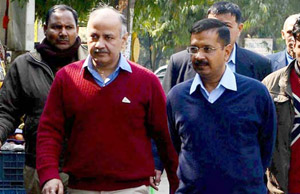New Delhi, Mar 17: Chief Minister Arvind Kejriwal, his deputy Manish Sisodia and dissident AAP leader Yogendra Yadav were today forced to appear before a Delhi Court in a criminal defamation case after their failure to do so drew a stinging remark by the judge that they have "no respect for law".
"There is nothing to reflect why the accused (Kejriwal, Sisodia and Yadav) have not appeared. Accused have no respect for law. Considering no one has appeared for accused, I am keeping the matter pending at 2PM. Call at 2PM," Metropolitan Magistrate Mayuri Singh said after the trio failed to comply with court's order that they were to "positively" appear today.
Hours after the court rejected their plea for exemption from personal appearance for the day citing lawyers' strike, the Chief Minister, Deputy CM and Yadav showed up before the Magistrate who marked their presence and fixed the case for May 2 for pronouncing order on the issue of whether to frame charges against the accused.
Kejriwal and Sisodia reached the court room together at around 1.45 pm while AAP leader Yogendra Yadav arrived few minutes later.
The presence of the Chief Minister resulted in over crowding of the court room and the premises prompting the magistrate to ask the onlookers to vacate the room.
On the arrival of the three leaders, the police barricaded the premises and the court room, which was already filled with advocates, litigants, mediapersons and staff of other courts, was latched from inside.
The case was put up before link magistrate Singh as Metropolitan Magistrate Muneesh Garg, before whom the matter was going on, was on leave today.
"As the presiding officer (before whom the case is going on) is on leave, I will fix the case for the purpose already fixed and will give you the date.
"I have marked the presence of the three accused, they can leave," the magistrate said.
The three leaders had sought exemption from personal appearance for the day saying the case was at a crucial stage and the presence of advocates was necessary.
Later on, the lawyers, including senior advocate H S Phoolka and advocate Rahul Mehra, who accompanied the AAP leaders were without bands due to the strike.
In the morning, the court had directed them to personally appear before it at 2 pm saying there was no ground for exemption from their appearance and they "have no respect for the law".
The court said the exemption application displayed no reason for the absence of the accused.
The court had noted that a clerk appeared on behalf of the accused and their advocates and moved the exemption plea.
The exemption plea, however, was opposed by complainant and advocate Surender Kumar Sharma saying the lawyers are on strike and not the litigants.
"It is mockery of justice. It would not be in the interest of justice if any adjournment is given in the case as the matter had earlier been adjourned three times due to absence of the accused," he said.
The court had earlier issued summons against the three AAP leaders under sections 499, 500 (defamation) and 34 (common intention) of the IPC, and had said there was prima facie material to summon the accused.
The court had granted bail to Kejriwal, Sisodia and Yadav, after they had appeared before it on June 4 last year in pursuance to summons against them.
In the post-lunch proceedings, complainant Sharma who was accompanied by large number of lawyers sought court's permission to advance arguments.
However, the magistrate denied the request saying the concerned court will hear the matter on the next date of hearing.
The court on February 11 had given last opportunity to Kejriwal, Sisodia and Yadav and directed them to positively appear before it today as it was scheduled to pass order on the issue of framing of charges.
Sharma, in his complaint, had alleged that in 2013 he was approached by volunteers of AAP who had asked him to contest the Delhi Assembly elections on a party ticket, saying Kejriwal was pleased with his social services.
He filled up the application form to contest the polls after being told by Sisodia and Yadav that AAP's Political Affairs Committee of the party had decided to give him the ticket. However, it was later denied to him.
On October 14, 2013, the complainant claimed that articles in leading newspapers carried "defamatory, unlawful and derogatory words used by the accused persons" which have lowered his reputation in the Bar and the society.
While issuing summons against AAP leaders, the court had said, "The press release published in newspapers as well as testimonies of witnesses reflect that defamatory remarks were published in the newspaper which affected the reputation of the complainant in the society and lowered his reputation in the eyes of other members of the society."





Comments
Add new comment